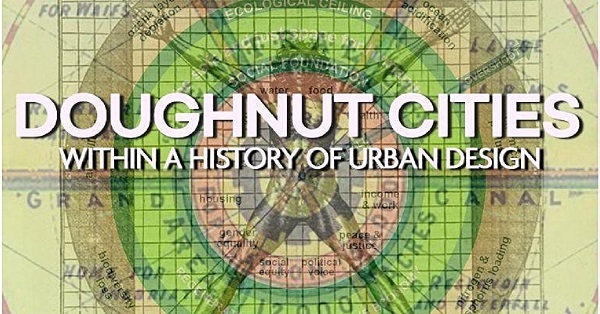"We invite every visionary 21st century city to ask itself this question: How can your city become a home to thriving people in a thriving place while respecting the wellbeing of all people and the health of the whole planet?" - Kate Raworth, 2020
Doughnut Economics and the Doughnut City occupy a prominent position within discussions about the future of urban design. The Doughnut, conceived as a global ‘compass’ for human and planetary thriving, proposes ‘a safe and just space for humanity’ where the needs of all are met whilst respecting planetary boundaries.
This concept has been framed as a significant departure from the history of economic thinking, which has long prized GDP as a measure of richness, progress, and wellbeing whilst producing inequality and environmental damage. Also, visually, the Doughnut deviates from mainstream representations of economic ‘laws’ as linear diagrams, offering the circle as a more dynamic and organic image.
We suggest that the image of the circle must be understood in the context of another history: the history of ideal city design. There is a Western tradition of thinking about how an ideal city should be built. From Renaissance interpretations of Vitruvius’ De architectura to Ebenezer Howard’s Garden City, goals like justice and health have long been pursued in the form of abstract, circular solutions.
Many of these circular schemes have sought to rationally control the built environment, and have been implemented to negative effect following colonial logics. Is the Doughnut a part of this tradition and its politics? Can this historic context help to clarify possible pitfalls and presumptions the Doughnut should avoid? Can it help us to understand why the Doughnut and its visual narrative have been received so well?
Following a critical reflection on the history of circular urban design, the workshop will provide a guided and open space for discussion between historians, urban planners, and renegade economists to explore the intersections between doughnut cities, circular models, and planning justice. Your insight and participation will contribute to a scientific publication on the topic.
_________________________________________________________________________________________________________________
Sofia Greaves (PROSPERA, University of Vigo) & Patrick Léon Gross (Donut Berlin & Erasmus University Rotterdam)
Sofia works for the PROSPERA project (European Research Council), researching the forms of organisation and innovation needed to create a future no longer obsessed with economic growth: one centred on wellbeing. She is interested in urban planning, placemaking, utopia and public health. Sofia completed her PhD at the University of Cambridge studying ideal cities and nineteenth-century urban planning as part of the 'Impact of the Ancient City' Project (ERC). Her future research projects will focus on the redevelopment of vacant buildings, and the use of artistic methods in encouraging experimental, participatory planning.
Léon co-initiated Donut Berlin as a think-and-do tank in the spirit of collaborative urban activism. He studied earth system science, philosophy, and economics in Europe and the US, always curious about the complex ways in which people understand, relate to, and resist planetary breakdown. Grounding his work in principles of care, craft, and creativity, his experience includes roles as an academic, speaker, founder, journalist, lecturer, consultant, and community organizer. As a Deloitte and SAP SE fellow, he currently holds a position as a visiting fellow at the Erasmus University of Rotterdam, where he researches urban sustainability transitions beyond capitalism.

Felipe Schmidt Fonseca
Berlim, Berlin, Alemanha
My PhD research investigates waste prevention and smart cities, through practices of reuse (repair, upcycling, re-circulation).